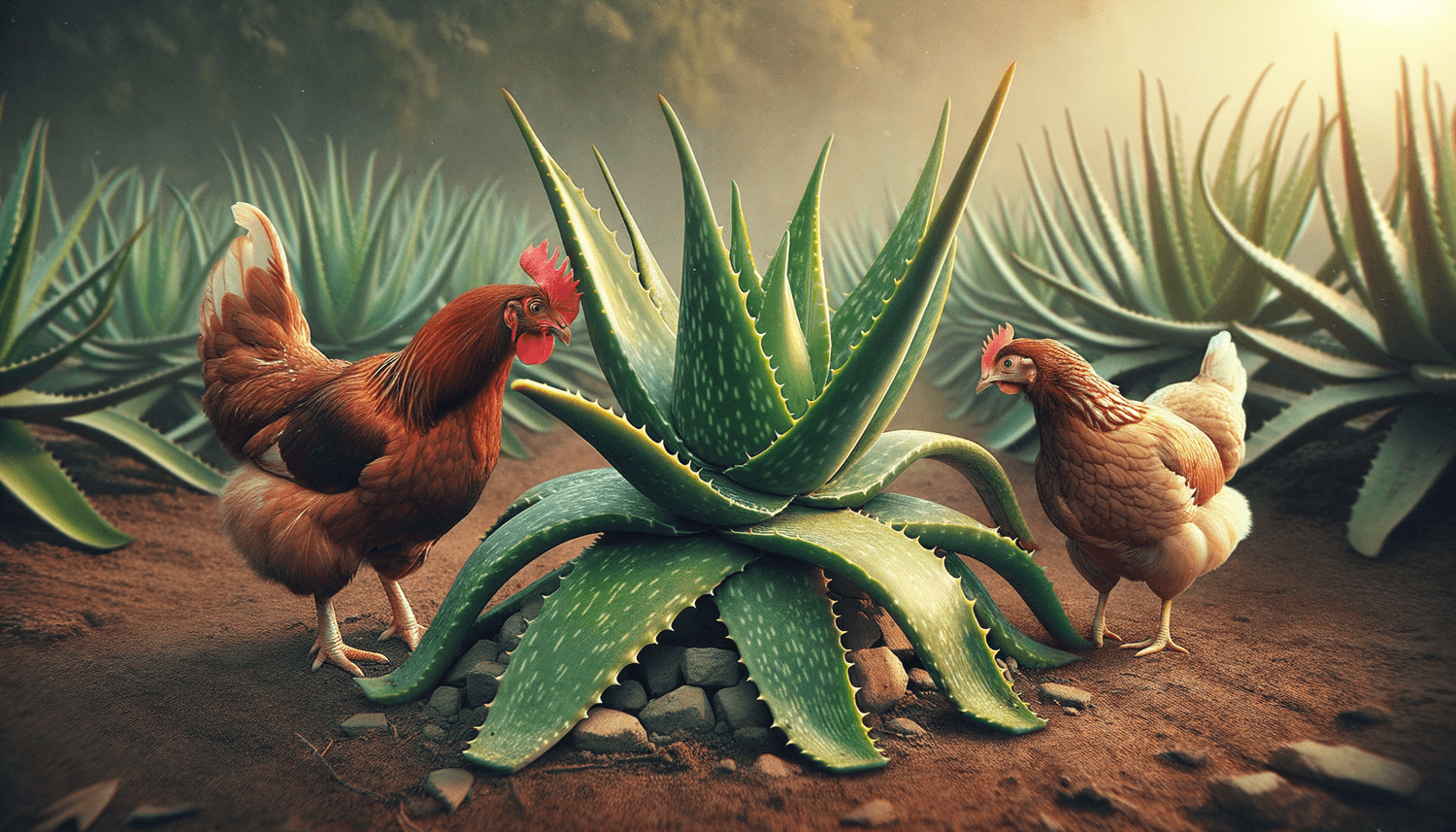Hey there cluck-tastic friends, have you ever found yourself peering curiously at your elegant Aloe Vera plant while your chickens are munching away on their usual fare? I know I have! So let’s dive into the plucky question that has us all scratching for answers — can chickens eat Aloe Vera plants? In this egg-citing blog post, we’ll explore the nutritional value behind the spiky green leaves of these succulents, possible benefits and risks, and how to serve it up to your feathered friends just right. Stick with us as we dig deep and make sure your hens maintain a beak-smackingly balanced diet!
Can chickens eat aloe vera plant?
No, chickens should not eat Aloe Vera plants, as it is not safe for them. Aloe Vera contains several compounds such as anthraquinones, which can be toxic to chickens when ingested in large amounts. While it has a myriad of benefits for humans, it is best to keep this plant out of your flock’s reach to ensure their well-being.
Chickens need a balanced diet too
Just like us humans, chickens also need a well-rounded and balanced diet to thrive and maintain optimal health. This doesn’t just mean scattering a bunch of random food scraps for them to peck at; there is a proper ratio of nutrients to follow for the sake of your flock’s well-being. Central to this, is the reliable backbone of their meals: chicken feed.
A high-quality chicken feed should make up around 80-90% of a chicken’s diet. This staple food is specifically designed to provide them with the essential mix of protein, vitamins, and minerals necessary for strong bones, good egg production, and overall health. The remaining 10-20% of their diet can consist of treats to spruce things up a bit – think fruits and veggies, for instance. Not only do these add some zest to their daily routine, they’re also vital sources of natural goodness.
Nutritional value of aloe vera plant for chickens.
While Aloe Vera plants do have many beneficial properties for humans, they are not an appropriate food source for chickens. As mentioned earlier, chickens should not be fed Aloe Vera due to potential toxicity risks. Though Aloe Vera contains various vitamins, minerals, and provides hydration, these benefits do not outweigh the risks it poses to our feathery friends.
Anthraquinones, found in Aloe Vera, can be harmful to chickens when consumed in large quantities. These compounds can lead to digestive issues, resulting in an unhappy and unhealthy flock. As a responsible chicken owner, it’s essential to prioritize their safety by avoiding the inclusion of Aloe Vera in their diet, despite any positive nutritional aspects that it may offer to humans
Nutrition table of aloe vera plant for chickens.
| Information | Description |
|---|---|
| Nutritional Value | Not suitable for chickens due to toxicity risks |
| Suggested Serving Size | Not applicable as chickens should not eat Aloe Vera |
| Safe Feeding Practices | Keep Aloe Vera out of reach to ensure flock’s well-being |
| Preparation | No preparation needed, as chickens should not consume Aloe Vera |
| Potential Risks | Anthraquinones in Aloe Vera can cause digestive issues in chickens |
| Hydration | Not relevant, as chickens should not ingest Aloe Vera |
| Digestion | Chickens may experience discomfort and complications from consuming Aloe Vera |
| Seasonal Availability | Year-round, but not recommended for chickens |
| Other Benefits | Benefits are not applicable to chickens due to toxicity risks |
Alternative Treats for Chickens
As we’ve established that Aloe Vera is not a suitable treat for chickens, you might wonder what other options are available. Chickens enjoy various fruits and vegetables that are both safe and nutritious. Offer treats like chopped apples, strawberries, watermelon, leafy greens, or even cooked pumpkin as occasional supplements to their primary diet of chicken feed.
Being mindful of portion sizes is important, so remember to keep the treats to roughly 10-20% of their overall diet. Chopping larger fruits and vegetables into small, manageable pieces is not only safer for your flock but also ensures that everyone gets a share of the tasty tidbits.
Monitor Their Diet and Well-Being
Keep a watchful eye on your chickens and their overall well-being. It is always a good idea to monitor the appearance of their feathers, the quality of their eggs, and overall energy levels. If you notice any unusual behavior or physical symptoms, it could be a sign that their diet needs adjustment or that they have consumed something unsuitable, like Aloe Vera.
If you suspect your flock has been nibbling on Aloe Vera, consult a veterinarian or an expert in poultry care to ensure their health and proper treatment. Timely intervention is vital in addressing potential health issues in your flock.
Enjoy a Happy and Healthy Flock
Maintaining a balanced diet and avoiding unsuitable foods like Aloe Vera is essential for the well-being of your backyard chickens. By providing nutritious, safe treats and appropriate chicken feed, your flock will thrive with good health, luscious feathers, and abundant egg production. By acting responsibly and vigilantly, you’ll ensure your chickens can live their best life — and in turn, bring happiness and satisfaction to you as their caregiver.

















